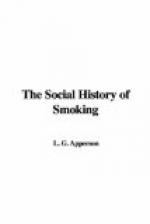Angelo gives some lively pictures of scenes of this kind in the London of about 1780. The Turk’s Head, in Gerrard Street, was the meeting-place for “a knot of worthies, principally ‘Sons of St. Luke,’ or the children of Thespis, and mostly votaries of Bacchus,” as the old fencing-master, who loved a little “fine writing,” describes them; and here they sat, he says, “taking their punch and smoking, the prevailing custom of the time.” About the same time (circa 1790) an evening resort for purposes mostly vicious was the famous Dog and Duck, in St. George’s Fields. “The long room,” says Angelo, “if I may depend on my memory, was on the ground floor, and all the benches were filled with motley groups, eating, drinking, and smoking.” Angelo also mentions the “Picnic Society,” a celebrated resort of fashion at the beginning of the nineteenth century, where the odour of tobacco never penetrated. It afforded, he says in his fine way, “a sort of antipodeal contrast to these smoking tavern clubs of the old city of Trinobantes.” The same writer speaks of a certain Monsieur Liviez whom he met in Paris in 1772, who had been one of the first dancers at the Italian Opera House, and maitre de ballet at Drury Lane Theatre. This gentleman was addicted to self-indulgence, loved good eating, and good and ample drinking, and moreover kept “late hours, a l’Anglaise, smoked his pipe, and drank oceans of punch.”
Coleridge, in the “Biographia Literaria,” gives an amusing account of his own experience of an attempt to smoke in company with a party of tradesmen. In 1795 he was travelling about the country endeavouring to secure subscriptions to the periodical publication he had started called The Watchman. At Birmingham one day he dined with a worthy tradesman, who, after dinner, importuned him “to smoke a pipe with him, and two or three other illuminati of the same rank.” The remainder of the moving story must be told in Coleridge’s own words. “I objected,” he says, “both because I was engaged to spend the evening with a minister and his friends, and because I had never smoked except once or twice in my life-time, and then it was herb tobacco mixed with Oronooko. On the assurance, however, that the tobacco was equally mild, and seeing too that it was of a yellow colour,—not forgetting the lamentable difficulty I have always experienced in saying, ‘No,’ and in abstaining from what the people about me were doing,—I took half a pipe, filling the lower half of the bole with salt. I was soon, however, compelled to resign it, in consequence of a giddiness and distressful feeling in my eyes, which, as I had drunk but a single glass of ale, must, I knew, have been the effect of the tobacco. Soon after, deeming myself recovered, I sallied forth to my engagement; but the walk and the fresh air brought on all the symptoms again, and I had scarcely entered the minister’s drawing-room, and opened a small pacquet of letters, which he had




